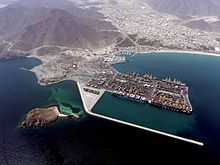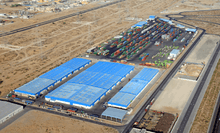Gulftainer
 Gulftainer logo | |
| Limited Liability Company | |
| Industry | Port Operations & Management and Transport & Logistics |
| Founded | 1976 |
| Headquarters | Sharjah, United Arab Emirates |
Area served | United Arab Emirates, Iraq, Lebanon, Saudi Arabia, Brazil, Pakistan, Turkey, and the United States |
| Products | Port investment, development, management and operations. Transport of all cargo types including: project cargo; Third party logistics; freight forwarding; contract logistics; container repairs and minor ship repairs |
| Services | Ports and logistics management |
| Parent | Crescent Enterprises |
| Subsidiaries | Momentum Logistics |
| Website |
gulftainer |
Gulftainer is a global port terminal operator with its corporate head office in the United Arab Emirates (UAE). The company, established in 1976, has business operations throughout the world.
In the UAE, Gulftainer operates three container terminals on behalf of the Sharjah Port Authority: Khorfakkan Container Terminal, located on the east coast, handling about four million TEUs annually; Sharjah Container Terminal, based in Port Khalid, which is a major import–export facility for industries located in Sharjah, in the UAE's industrial zones, and in the Northern Emirates, along with container facilities in Hamriyah Port. In addition, Gulftainer owns and operates the Sharjah Inland Container Depot (SICD), a large inland terminal that provides 35 covered warehouses, custom clearance, storage facilities and a container depot.
Gulftainer operates two terminals in Iraq: the Iraq Container Terminal and the Iraq Projects Terminal at the Umm Qasr Port along with the Umm Qasr Logistics Centre. Gulftainer added new facilities in Brazil and Lebanon to its portfolio in 2012 and 2013, along with a significant investment in Gulf Stevedoring Contracting Company (GSCCO), based in Saudi Arabia.[1] Gulftainer now operates eight terminals in the Middle East.[2] Gulftainer also established Momentum, a third party logistics company focusing on transport, warehousing, container repair, logistics & freight solutions.[3]
History
Gulftainer was formed in 1976 and was awarded the contract to manage and operate the Sharjah Container Terminal (SCT) by the Sharjah Port Authority. To augment its services, in the same year, Gulftainer purchased Speedtrux and Trucktainer and began its transport division. In 1986, the Sharjah Port Authority awarded Gulftainer a second contract to manage and operate Khorfakkan Container Terminal (KCT) in Khorfakkan Port, Sharjah. In 1986, Gulftainer opened a container repair division at SCT and KCT to offer additional services to its customers and to keep pace with the growing UAE economy. In 2004, Gulftainer expanded beyond the UAE when the Kuwait Port Authority confirmed Gulftainer as consultant for Shuwaikh Port operations. Later that year, it inaugurated the purpose-built Sharjah Inland Container Deport (SICD) near the Sharjah–Dubai border.[4]
The company expanded into South Asia in 2006,[5] as it commenced joint ventures with Pak Shaheen for transport and logistics ventures in Pakistan, and into Africa when it formed Gulf-Com, a joint venture with Al Marwan to manage and operate Moroni Port in the Comoros Islands.

In 2008, a transport and logistics venture in Turkey began in partnership with Demas International; this also led to the launch of Momentum, a full-service third-party logistics company. Increased business lead to the acquisition of a logistics contract to operate Ruwais Port in Abu Dhabi (UAE) and Sulaimaniyah Airport and Cargo Logistics, in Iraq in 2009.
The Iraqi Port Authority awarded Gulftainer the concession to operate and manage container facilities in Umm Qasr Port, the key marine gateway to Iraq. Terminal operations started on Berth 8 in August 2010; and a new container terminal, Iraq Container Terminal, with a capacity of 600,000 TEUs, commenced operations in mid-2012. In Iraq, Gulftainer is also active in transportation and has several investment projects throughout the country. In 2011, Gulftainer initiated a logistics city development in Umm Qasr.[6] Umm Qasr Logistics City has a total area of 750,000 square metres, comprises two dock entry warehouses of 5,400 square metres each and one ground entry warehouse of 1,350 square metres, along with two administration buildings with 46 individual 31.5 square-metre office spaces with on-site customs, IPA and documentation offices.[6]

In the same year Gulftainer Company Limited signed a major joint venture agreement with Prominvest, the financial and investment arm of Russian State Corporation, Russian Technologies to develop projects in Russia.[7] The company made its first expansion into South America, by establishing terminal operations in the Port of Recife, Brazil in 2012. On November 13, 2012 Gulftainer was awarded the concession to develop and operate a new container terminal at the Port of Tripoli in Northern Lebanon[8] The concession is to last for 25 years with an investment of over USD 75 million in new equipment and machinery, including four super post panamax gantry cranes, twelve rubber tyred gantry (RTG) cranes and the latest technology in other container handlers and yard management systems. In June 2013, Gulftainer announced its 51% acquisition in Saudi Arabia’s Gulf Stevedoring Contracting Company (GSCCO). Gulftainer now operates facilities within three Saudi terminals, located in Jeddah and Jubail ports. This acquisition makes Gulftainer the largest port operator in the Middle East with regard to the number of terminals managed.[9]

In June 2014, Gulftainer signed a 35-year concession with the Canaveral Port Authority in Florida, in the United States to operate and further develop its container and multipurpose cargo terminal. The terminal, set to commence operations in the first quarter of 2015, aims to position Port Canaveral as the most economical and convenient ocean gateway for containerized cargo in central Florida. This agreement marks Gulftainer's first venture in the United States.[10]

The company today manages 40% of all the major container terminal facilities in the Middle East that have the capacity to handle ships of 12,000 TEU or greater in size. Gulftainer's KCT was the first port of call[11] in the Middle East for CMA CGM's Marco Polo – at the time, the world's largest container ship – on its maiden voyage across the Persian Gulf. The "Explorer Class" vessel is the length of four standard football pitches (396 metres (1,299 ft)) and 54 metres wide and KCT is one of few ports in the region that is able to accommodate the CMA CGM Marco Polo's 16,020 TEU capacity.
Operations

Gulftainer Group operates and manages ports and logistics businesses in several countries, including the UAE, Iraq, Saudi Arabia, Lebanon, the USA, Pakistan, Brazil, and Turkey. Gulftainer operates three main UAE ports on behalf of the Sharjah Port Authority – Sharjah Container Terminal (SCT), Khorfakkan Container Terminal (KCT) and Al Hamriya. In Iraq, Gulftainer operates two berths within the Umm Qasr Port, and the recently opened Umm Qasr Logistics Centre;[12] in Brazil it manages services within the Port of Recife, and provides stevedoring services within the Port of Suape; in Lebanon from 2016, it will operate facilities in the Port of Tripoli; whilst in the USA, Gulftainer will commence operations of all container facilities in Port Canaveral, Florida from mid-2015.[13]
Gulftainer's non-port business activities include providing 3PL (Third party logistics) services within the UAE, Iraq, Turkey and Pakistan. Momentum Logistics, Gulftainer's logistics subsidiary, was established in 2008; it manages the group's transportation and logistics operations throughout the Middle East, and into Europe and Asia[3]
The company also owns and operates the Sharjah Inland Container Depot on the Dubai—Sharjah border with services ranging from customs clearance, warehousing and storage, to inland transportation. Gulftainer has also embarked upon developing a logistics centre in Umm Qasr, Iraq spread over an area of 750,000 square metres (8,100,000 sq ft).[6]
In 2012, Gulftainer recorded a 24 per cent overall increase on trade volumes when compared with 2011.[5] Its Sharjah ports saw the greatest volume increase during the same period, with KCT seeing growth of 28 per cent on its 2011 figures, increasing throughput to over 3.3 million TEU.[11][5] KCT was recognized as the most productive port in Europe, the Middle East and Africa (EMEA) by the Journal of Commerce port productivity report for 2013. It was also awarded a second place in the top 10 terminals in EMEA and third in the top 10 worldwide ports category.[14]
See also
References
- ↑ "UAE's Gulftainer acquires 51 percent stake in Saudi Gulf Stevedoring". Reuters. 23 June 2013. Retrieved 21 April 2014.
- ↑ "Corporate Profile". Gulftainer. Retrieved 8 March 2015.
- ↑ 3.0 3.1 "Container Repair". Momentum. Retrieved 21 April 2014.
- ↑ "Sharjah Inland Container Depot". Retrieved 21 April 2014.
- ↑ 5.0 5.1 5.2 "Facts and Figures". Gulftainer.
- ↑ 6.0 6.1 6.2 "Umm Qasr Logistics Centre". Gulftainer. Retrieved 8 March 2015.
- ↑ "Gulftainer to invest $500m in Russia". Trade Arabia. Retrieved 21 April 2014.
- ↑ "Lebanon signs contract with Gulftainer for Tripoli. port". 9 October 2013. Retrieved 21 April 2014.
- ↑ "Global Container Terminal Operators annual review and forecast 2013". Drewry.
- ↑ "Gulftainer Expands into USA". Gulftainer. Retrieved 8 March 2015.
- ↑ 11.0 11.1 "Gulftainer sees 24% increase in 2012 trade volumes.". Gulftainer. 17 Feb 2013. Retrieved 8 March 2015.
- ↑ "Iraq Container Terminal". Gulftainer. Retrieved 8 March 2015.
- ↑ "Sharjah's largest port handler sees double growth in 2013". Sharjah Port Authority.
- ↑ Mongelluzzo, Bill. "Port Productivity". JOC Group. Retrieved 8 March 2015.